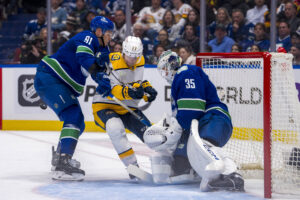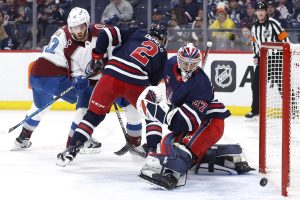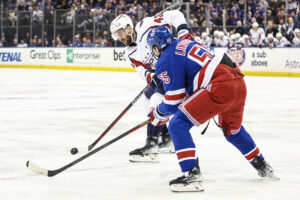A Stanley Cup heals all wounds. Or something like that. The San Jose Sharks fired head coach Peter DeBoer and assistant coaches Johan Hedberg, Steve Spott and Dave Barr last week. It is fair to say this season’s Sharks have not been good, not the team they were envisioned to be.
ESPN’s Greg Wyshinski posed the question “Was this really DeBoer’s fault?”
There is no reason to equivocate on this answer. It is in fact true that DeBoer’s demise was ultimately DeBoer’s fault.
Peter DeBoer By The Numbers
In his Sharks tenure, DeBoer coached four full seasons and each full season, the team made the playoffs, garnering between 98 and 101 regular-season points. The Sharks won the Western Conference in DeBoer’s initial season, making and falling to the Pittsburgh Penguins in the Stanley Cup Final. It is the highest point in franchise history.
In total, the Sharks won six playoff series under DeBoer, including two last season.
The team’s overall regular-season record under DeBoer was 198-129-34 and 32-28 in the playoffs. All in all, these are elite numbers.
Still, numbers only tell part of the story and with DeBoer (to borrow from Paul Harvey), it always seemed to be about the rest of the story.
Yes, DeBoer posted elite numbers. But he also had elite rosters. Yes, the team had postseason success, but it always seemed DeBoer missed with a critical decision which might have given the team a better chance to accomplish more.
DeBoer had the benefit and curse of high expectations, making his years in Sharks Territory feel far less positive than the numbers suggest.
Giving Peter DeBoer Credit
There is plenty DeBoer did right in his Sharks tenure. He implemented solid systems that worked effectively when the team stuck to them. He seemed to have a good command of the locker room and the respect of the players. There were times when others panicked, but DeBoer didn’t and the team recovered. During times when the team surged, DeBoer wisely got out of the way, allowing the players to take control of their fate.
DeBoer may have been stubborn to a fault, but it paid off in last season’s opening playoff round when he stuck with goalie Martin Jones despite the netminder’s ineffective play through four games. DeBoer faced a barrage of skepticism/criticism for the choice to start Jones in Game 5. It worked and the Sharks went on to win the opening round series by winning the final three games.
The head coach rarely criticized players in public and generally managed the media well. Like most smart managers, he put blame on himself when things went wrong and offered praise to others when things went well.
There was a lot to like about Peter DeBoer in his Sharks tenure. However, given that he was given a roster filled with exceptional talent and the bar for success was set high, DeBoer had little room for error.
Criticizing Peter DeBoer
There have also been plenty of issues with DeBoer’s coaching over the years. His approach of using five defenceman has been a failure and it was again this season. His doghouse seemed to target the wrong players. The tendency to employ toughness over skating talent was another issue. Line-up decisions, often choosing reputations over chemistry, was problematic. DeBoer had a tendency to burn out his high-end players and this proved even more problematic. His constant use of the line blender, while it worked at times, was also disruptive and often led to more problems than it solved.
DeBoer’s Lack Of Foresight
The most troubling issues are ones that DeBoer failed to anticipate, even as the issues were apparent to others. For example, questions were raised about on his defensive pairings prior to the 2016 Stanley Cup Final against the Penguins and during the 2018 playoff series against the Vegas Golden Knights. In the former, DeBoer was questioned about using the pairing of Roman Polak and Brenden Dillon, both slower players against the fast forechecking Pens. DeBoer dismissed concerns and left puck-moving defenceman Dylan DeMelo on the bench for the entire series. The Pens ate the Dillon-Polak pairing alive, keying their championship.
Two seasons later, (many of the same) people questioned DeBoer’s use of ageing defenceman Paul Martin against the fast forechecking Golden Knights. Paul Martin predictably struggled. He and partner Brent Burns made a horrific play on the Knights game-winning overtime goal in Game 3, and it proved the turning point of the series. DeBoer distrusted Martin in Game 3, playing the veteran just ten minutes (his partner played 37) despite the game going deep into overtime. In Game 4, DeBoer switched to Joakim Ryan who played the remainder of the series, but the Game 3 loss proved too much to overcome.
Twice in his four years as Sharks coach, the team has undergone massive meltdowns in March. The first time around, in 2016-17, DeBoer acknowledged the team “ran out of gas”. The coach was the problem. He knew a long season followed by a short off-season and regular season with a high-travel team plus a compressed schedule all added up to risk of running out of gas. Yet DeBoer did nothing to mitigate the risk.
Did DeBoer learn from this? Last season (2018-19) the story repeated itself, with the Sharks, once again, melting down in March.
Peter DeBoer And The Erik Karlsson Call
DeBoer also was part of another troubling call last season, the choice to play Erik Karlsson following his January injury. To be fair, the call was certainly not DeBoer’s alone, the medical staff played a role here. Still, it is ultimately DeBoer’s call and what occurred may well have cost the Sharks a Stanley Cup and, indirectly cost DeBoer his job.
As the team’s best player (with a strong case as the NHL’s best player) when healthy, it was imperative to make sure Karlsson was as healthy as possible for the playoffs. Injured in January, Karlsson returned to the line-up in February and DeBoer play him 24 minutes in his return game and 28 minutes the following game. Karlsson re-injured himself in his third game back. Still, DeBoer trotted Karlsson out the next game and what occurred was stomach-churning. Karlsson clearly re-injured himself and yet, DeBoer returned Karlsson to the game until it was apparent Karlsson could barely skate.
We’ll never know if Karlsson’s re-injury in February impacted his skating for the playoffs, but it seems highly likely. We do know he wasn’t close to fully healthy during the playoffs.
We also know the games in February were close to meaningless when compared to the playoff games which began two months later. By playing Karlsson as he did, DeBoer took a major risk for what amounted to zero rewards. It is Peter DeBoer’s job, the essence of his job, to understand risk and reward.
The Karlsson Ramifications
While it is impossible to know how healthy Karlsson might have been for the playoffs, it is fair to say the Sharks chances for a Stanley Cup would have been much greater with a healthy (or healthier) Karlsson. Was a healthy Karlsson the difference between the Sharks loss in the Western Conference Final and a Stanley Cup win? Probably. He was that good.
There is little doubt about one thing. Had the Sharks won the Stanley Cup in 2019, the prize which heals all wounds, DeBoer would have received much greater latitude for this season’s disappointing start. There were enough errors around handling Erik Karlsson’s injury last season to have several culprits. But only one person, DeBoer, had the authority to ”just say no” because the risk-reward equation was just wrong. If DeBoer had said he wanted Karlsson shut down until close to the playoffs to maximize his recovery, he might well have a Stanley Cup and still be the Sharks coach today.
Five Defencemen And The Peter DeBoer Doghouse
One of the first articles I wrote about DeBoer as the Sharks coach came early in his first season. He used a five defenceman approach and it didn’t work. The approach used six defencemen to begin the game, then saw one of the defenders benched usually between the game’s midpoint and the end of the second period. The numbers were overwhelming, the Sharks were better in the first part of games then the latter part of games. The five defenceman strategy failed then and continued to be a problem throughout DeBoer’s tenure, including this season.
Defenceman Tim Heed occupied DeBoer’s doghouse this season. What has Heed done? In 200 minutes of 5-on-5 play over 20 games, Heed has been on the ice for five goals for the Sharks and five against. This is the best result of any Sharks defenceman; next best is Karlsson who has been on ice for three more goals allowed than scored. Heed has played only about one-third of the minutes of teammate Brent Burns, but Burns has been on the ice for eight times as many goals against the Sharks. So yeah, about that doghouse.
Another recent member of the doghouse was Joonas Donskoi. He played in just 12 of the Sharks 20 playoff games last season, including times where he sat and pugilist Micheal Haley played instead. No doubt the talented Donskoi was anxious to leave the Sharks and at seasons’ end, he did. This season, Donskoi is third on the high-flying Colorado Avalanche with 27 points in 32 games. He’s playing four more minutes a night and succeeding. He never scored more than 37 points as a Shark and saw his playing time drop last season. How does a talent like Donskoi get stuck in the coach’s doghouse? It is inexplicable.
Peter DeBoer Skill And Luck
DeBoer benefitted from some unusual situations, none more so than the five minute major against the Golden Knights in last season’s epic Game 7 comeback win. Had the Sharks gone out in the opening round, it isn’t clear DeBoer would have remained coach. Instead, the Golden Knights decided, with a three-goal lead well into the third period, to abuse Joe Pavelski, taking several dirty shots at the San Jose captain before incurring the (well-deserved) major penalty heard round the league.
In the second round, against the Colorado Avalanche, the Sharks won again, again in seven games. The win in the finale saw the Sharks catch several breaks. These included an overturned goal by the Avs (technically a correct call, using an absurd rule) and a tripping penalty which went uncalled, but should have resulted in a penalty shot for the Avs best player, Nathan McaKinnon.
The DeBoer-led run to the Stanley Cup Final in 2016 was aided by an incredibly healthy team coupled with a relatively weaker set of opponents, including a badly beaten-up Los Angeles Kings team which the Sharks were able to roll through in the opening round.
Giving credit where it is due, the DeBoer-led Sharks put themselves in positions where good luck made major differences. Still, in each of these cases, DeBoer and the Sharks were at least as lucky as they were good.
Managing The Netminders, Three Good Seasons
The Sharks hired Peter DeBoer in May of 2015 and acquired goalie Martin Jones one month later.
In their time together, Jones was the league’s most heavily used goalie – second place isn’t close. While appearances can be deceiving, the tall, slender netminder looks less like an athletic workhorse and more like a guy who might blow away in a stiff breeze.
Only once, during a Martin Jones injury, did DeBoer turn to Aaron Dell (Jones back-up since October 2016) and give him the starting job. Dell led the team to a 4-1-1 mark during the stretch, despite at one point having to play four games in six days (his play falling off after playing on back-to-back nights). Dell showed, in his only ‘extended’ look as a starter, he was capable.
Yet DeBoer applied a very ‘short-leash’ approach with Dell – one bad game and it was back to the bench for an extended stay.
Jones largely rewarded DeBoer’s faith in his first three seasons. In those seasons, Jones was league average in the regular season and quite good in the playoffs.
Managing The Netminders, Season Four And Five
Things turned ugly in their fourth season together. Despite Jones failing time after time, Peter DeBoer showed unwavering trust in the league’s most heavily used (read overworked) goalie. Jones was among the league’s worst netminders last season and is in the same group this season.
In his starts this season, Dell has posted a .903 save percentage and while that isn’t good, Martin Jones is delivering a miserable .888 figure. DeBoer had little to risk by giving Dell a full-fledged shot as the lead goalie and still decided it was better to ride the overworked and underperforming Jones. I speculated earlier Jones may be breaking down due to the extensive workload over the last four seasons – little has changed my mind on this since the original piece.
If Jones has broken down, it impossible not to consider DeBoer’s role in this. By riding Jones as hard as he has, he’s (again) on the wrong side of the risk-reward equation.
Further, there is ample evidence showing a regular-season workhorse goalie is unlikely to win a Stanley Cup. In the last decade, only one goalie played 60 or more games and won the Cup. Yet DeBoer has played Jones 60 or more games in every season and had Jones on track to repeat this again in 2019-20. By using Jones as he did, DeBoer risked damaging the netminder (it appears he succeeded in this) while attempting to defy the odds which show (clearly) that it is lesser used goalies who capture hockey’s biggest prize.
DeBoer’s Judgment
All too often, DeBoer missed what others saw. Whether it was playing the wrong defenceman in a playoff series or overusing a goalie year after year, DeBoer’s judgment deserved to be questioned. Burning out key players, struggling to develop younger talent, playing unhealthy players when they should have sat out – these all issues where DeBoer deserved to be under the microscope. All issues where he didn’t fare well.
Perhaps the biggest problem with DeBoer was a simple one. He didn’t seem to grasp whether his teams were playoff bound or not. A playoff-bound team doesn’t need to battle for every point in the standings or play as if the season hung on every shift. DeBoer had highly talented rosters. He had the ability to balance his players ice time to ensure the team was strong. Strong during the entire game, strong over the entire season and strong entering the playoffs.
In his first four seasons, DeBoer had the talent to make the playoffs with room to spare. But DeBoer fought for every regular-season point, often defying common sense. In last season’s March meltdown, the Shark went 1-9-1 over 11 games. During the meltdown, DeBoer skated Burns roughly 27 minutes per night (more than any NHL player’s ice time average for the season) and the big defenceman was minus-9 in those games. Talk about burning a player out for nothing. And oh yes, two seasons prior, in that Sharks March meltdown, no player melted down more than Burns. It’s like DeBoer refused to learn.
This season is the first time Peter DeBoer had a roster not deep or talented enough to cruise to the playoffs. This Sharks season really does depend on every shift of every game. Alas, he was unable to adjust to the new reality.
Two Key Problems
This season’s Sharks suffer from two key problems, not traceable to DeBoer.
The first issue is history. The Sharks have had plenty of bad patches and recovered to make the playoffs, season after season. The team has confidence there is no hole too deep to dig itself out of. Perhaps too much confidence. Past history is not always the best predictor of current results.
The second problem is the roster. Many, have noted how the Sharks hollowed out their roster due to salary cap challenges. Many blame general manager Doug Wilson here, but “blame” is the wrong word. Wilson made a call, the right call, to make the 2018-19 season an ‘all-in’ season. The consequences of the all-in season meant there was a price to be paid in 2019-20. The enormously talented 2018-19 Sharks roster was unsustainable for more than that one season. Simply put, there were too many high-end wallets to fill for 2019-20 and the Sharks ran out of cap space. Last season’s risk-reward was the right call, but the team came up short. This season’s roster reflects last season’s roll of the dice.
In part, this second reason is why DeBoer had to go. He squandered an exceptional roster last season (easily the best in Sharks history), barely making it out of round one. He played Erik Karlsson when he shouldn’t have. DeBoer choosing to insert an injured Karlsson into meaningless games in February instead of allowing him to recover as fully as possible for the critical games which began in April. DeBoer burned out Brent Burns for no particular reason. He broke apart the pairing of Marc-Edouard Vlasic and Tim Heed, the pairing with the team’s highest ‘goals for’ rating (GF%). In short, he didn’t give his team the best chance to win a Stanley Cup.
The Sharks Demise Of Peter DeBoer
DeBoer’s Sharks tenure lasted over four seasons and it reflects a record of accomplishment. But in the end, his shortcomings played a decisive role in his dismissal.
A Stanley Cup heals all wounds. Had last season’s team won the Stanley Cup, and they certainly had a roster capable of it, DeBoer would be forgiven for this season’s mediocre start. But DeBoer did not win a Cup and was vulnerable as a result. It is a harsh pill to swallow, but the expectations were justifiably high.
Ultimately, much of went wrong was of DeBoer’s own doing. Far too often, he left the team more vulnerable than necessary. In the end, it made DeBoer vulnerable.
In the award-winning play Hamilton, the refrain of the star is “I’m not throwing away my shot.”
DeBoer was a good coach who managed to coach his teams to good results. This is not enough. Winning a Stanley Cup requires a coach who can lift his team beyond their nominal abilities. It requires a coach who brings out greatness at the right times. DeBoer did no such thing. He threw away his shot. It was time for Peter DeBoer to go.
Main Photo: GLENDALE, AZ – OCTOBER 07: Head coach Peter DeBoer of the San Jose Sharks watches from the bench during the first period of the preseason NHL game against Arizona Coyotes at Gila River Arena on October 7, 2016 in Glendale, Arizona. (Photo by Christian Petersen/Getty Images)






